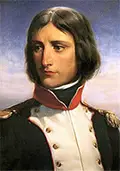Napoleon Bonaparte: Giant of the Age
Part 1: Born into Turbulent Times Napoleon Bonaparte was one of the most dynamic figures of the 19th Century. He enjoyed great military and political successes and suffered epic military defeats. He so dominated the European stage that the few decades either side of the turn of the century are referred to by a great many people as the Napoleonic era. He was born Napoleon Buonaparte on Aug. 15, 1769, in Ajaccio, Corsica. The island had a long history of conquest, from ancient times belonging to the Phoenicians, Etruscans, Carthaginians, and Romans, and Byzantines and then in medieval times to the Lombards, the Holy Roman Empire beginning with Charlemagne and a series of Italian states, including Pisa and the Papal States. Occupation by Genoa began in 1284 and lasted for nearly five centuries, until the declaration of the Corsican Republic in 1755. It was only in 1768 that France won control of Corsica. A year after Napoleon was born, his father, Carlo, was lending his influence to Pasquale Paoli, the leader of the Corsican resistance. Later that year, a French army invaded the island and defeated the rebels, forcing Paoli to flee. He went to England and lived in London for two decades. The opportunistic Carlo Buonaparte threw in his lot with the French; and his sons, who numbered two at that time, would eventually be able to attend the College d'Autun, a French school. 
The young Napoleon spent a few years at d'Autun and then enrolled at a Brienne military college. He followed up a five-year stint there with a transfer to the Paris military academy, at which he completed a three-year program in 12 months. His father died in 1785, and Napoleon's older brother, Joseph, assumed the role of head of the family. He gained a commission as a lieutenant of artillery at La Fère and joined a garrison at Valence. He split his time during the next several years between France and Corsica. 
He followed in other of his father's footsteps in 1789 when Paoli returned to start another revolt. However, Paoli and Napoleon had a falling out in 1791 and the latter returned to his garrison at Valence. Also at this time, he joined the Jacobin Club, the most well-known of the various political clubs that had sprung up across France in the past several years. He became a prominent member of the Club, giving many speeches, and served as president for a time. Back in Corsica in October 1792, Napoleon joined the Corsican Jacobins, who stood in opposition to Paoli and his drive to declare independence. A civil war begin in April 1793, and Paoli declared the Buonaparte family enemies of the state. They moved to the mainland and changed the family name to Bonaparte. Napoleon had been away from France during the turbulent months of late 1792 and 1793, in which the National Convention had tried King Louis XVI for treason and then sent him to the guillotine. 
France by this time as well was in the middle of the War of the First Coalition. Bonaparte reported to his regiment in Nice in June 1793 and then took part in the struggle for Toulon, which had revolted against French authorities and had received support from Great Britain, a member of the First Coalition. Promoted to major and then adjutant general, Bonaparte helped the French force drive the British from Toulon and then recapture it for the Republic. He won promotion to the rank of brigadier general in recognition of this. In his speeches in and dealings with members of the Jacobin Club, Bonaparte had become an associate of Augustin de Robespierre, the commissioner to the army, and his more famous brother, Maximilien. Brother spoke highly of the young general to brother, and Bonaparte found himself commandant of the artillery in the French Army of Italy by February 1794. That association with the Robespierres, who were removed from power in the July 1794 Thermidorian Reaction, led to Bonaparte's being arrested and charged with treason. The guillotine had stopped for a time after claiming the lives of the leaders of the Reign of Terror, and Bonaparte gained his release from prison in September. Next page > A New Government and War > Page 1, 2, 3, 4, 5, 6, 7, 8, 9, 10, 11, 12 |
|
Social Studies for Kids
copyright 2002–2024
David White




